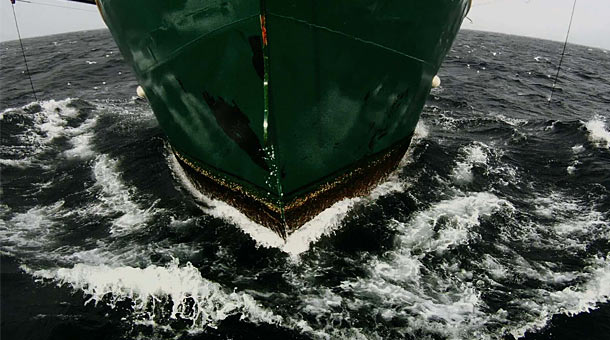
Leviathan truly is a sight to behold, a purely sensory experience and one of the most visceral films ever made.

Leviathan truly is a sight to behold, a purely sensory experience and one of the most visceral films ever made.
Leviathan opens with a passage from the Bible, a fitting prelude to the immense scale of the 90 minutes that immediately follow. The film itself is far from an epic production though; Lucien Castaing-Taylor and Verena Paravel started out making a documentary on a Massachusetts fishing port but, after going out with one of the boats their focus quickly changed. The force of Mother Nature soon overtook them, with several cameras getting lost at sea.
That’s when the co-directors tried another tactic, one that ended up defining the whole film. Using tiny GoPro HD cameras, Paravel and Castaing-Taylor put them all over the ship, letting the fishermen use them and at times connecting the cameras to a stick so they could dunk it underwater. The result is a film that appears to be unlike anything before it, directed mostly by the elements rather than a human being. It wouldn’t have been too out of place if Nature itself had a co-directing credit.
Much like the cameras are at the mercy of the ocean’s thrashing waves, viewers are also left to endure a full-frontal assault on cinematic and genre conventions. There is no narrative or context given for the footage in Leviathan. The cameras move around in every imaginable direction, with some sequences having no sense of perspective or placement in them whatsoever. Long sections seemingly flow together, making it impossible to tell whether or not there’s a cut or transition buried within all the fury. The sign of a visible cut feels like a breath of air, as if we can briefly re-calibrate ourselves before getting thrown back in. If Leviathan’s lack of control shows the chaos of nature, it simultaneously highlights the chaos of film without a narrative.

That feeling of not being tied down to anything, both literally and figuratively, is primarily what makes Leviathan such an exhilarating and terrifying film to watch. None of the moments throughout are as effective as when the camera goes out into the water, bobbing up and down as seagulls and fish remains from the boat surround it. These moments, when the camera comes up to the surface and shows nothing but water surrounding it, present the terrifying scale of the ocean in a way that’s rarely been seen before. Part of the anxiety comes from the brilliant sound design, mixing the sound picked up on the camera’s microphone to sound like someone gasping for air, but most of the horror comes from the feeling of complete insignificance it creates.
The cumulative effect of what’s in Leviathan is felt once the focus begins to include fishermen on the vessel. Actions become more abstract, with any sense of specificity sucked out from these moments. The focus is no longer on what they’re doing, instead merely observing bodies in motion. The fishermen, like the boat they’re on and the fish they take out of the sea, are small parts of a massive and unforgiving environment. Leviathan truly is a sight to behold, a purely sensory experience and one of the most visceral films ever made. It may only be three years in, but it looks like one of the decade’s greatest achievements has already been made.